#Jim Conti
Text
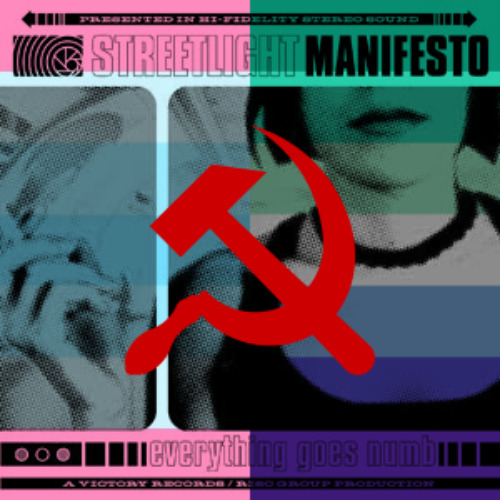
Everything Goes Numb by Streetlight Manifesto is Transmasc, Gay, and Communist!
requested by @spitblaze
#request#album#everything goes numb#transgender#trans#transmasculine#transmasc#trans masc#gay#communist#streetlight manifesto#Josh Ansley#Jim Conti#Jamie Egan#Tomas Kalnoky#Paul Lowndes#Dan Ross#ska punk#2003#i thought this was funny so i did it
42 notes
·
View notes
Text
youtube
#Sammy Guevara#Tay Melo#Tay Conti#Fuego Del Sol#Daniel Garcia#Daddy Magic#Angelo Parker#Jake Hager#Isiah Kassidy#Aaron Solo#Nick Comoroto#Brandon Cutler#Anna Jay#Jim Ross#Tony Schiavone#Orange Cassidy#aew#Youtube
3 notes
·
View notes
Photo

Paddington 2 ist noch abenteuerlicher und dramatischer als der erste, und bietet zudem ein wenig London-Sightsseing, sowie eine Sondheim-Nummer, von Hugh Grant in rosaroter Gefängniskluft vorgetragen. Was wollen wir mehr?
#Paddington 2#Julie Walters#Samuel Joslin#Ben Whishaw#Hugh Bonneville#Madeleine Harris#Sally Hawkins#Hugh Grant#Brendan Gleeson#Imelda Staunton#Eileen Atkins#Joanna Lumley#Jim Broadbent#Tom Conti#Film gesehen#Paul King
1 note
·
View note
Text
Top 5 Ships I have for Davina . Nobody asked but idgaf
( & if you're not listed here , doesn't mean you aren't a fav . i love you all with my whole heart ! )
Luciel Conti ( platonic / @mrchare )
Bandit Leonne ( romantic / @bandersnch )
Jim Kirk ( platonic / @darehearts )
Sam Winchester ( romantic / @ruinedmyself )
Apollo Hale ( romantic / @greedaeye )
9 notes
·
View notes
Text
OFMD Ficlet - XIII
Birds of a feather
Edward
Anche se le notti di Edward Teach cominciavano tutte in modo diverso, quando il sonno finalmente lo prendeva finivano tutte per assomigliarsi.
Tutte erano fatte di risvegli improvvisi e di strani sogni dalle lunghe spire, di sudori freddi e angosce piene di schegge che gli blindavano il respiro in scatole sempre più piccole, finché stanco di dibattersi non si rialzava in cerca di qualcosa da fare, di qualcosa da mordere, di un modo qualsiasi per zittire il lamentarsi delle ossa il contrarsi dei muscoli e l'infiammarsi del cervello.
///
Edward non era stato un bambino difficile.
Solo un po' piagnucoloso, quando era davvero molto piccolo; solo un po' pauroso, un po' irrigidito dal freddo della casa dove non c'era mai un fuoco, dove ogni passo doveva essere in punta di piedi e dove era meglio non parlare troppo forte, non occupare troppo spazio.
Una volta sola sua madre l'aveva picchiato; ma doveva essere proprio piccolo, perché lo ricordava appena.
Ricordava il pavimento umido, il muro gelido contro le vertebre, la fronte premuta sulle ginocchia mentre urlava che voleva lo lasciassero solo; e poi, non appena otteneva che la porta si chiudesse sulla stanza vuota, ricordava le urla che gli laceravano la gola per la paura di rimanere solo.
Ricordava il buio, gli occhi di sua madre quando alla fine, esasperata, gli aveva dato il ceffone che l'aveva poi zittito.
Ma dopo quella volta, tutto era andato liscio come l'olio; Edward aveva smesso di urlare e scalciare e di volere cose opposte contemporaneamente, suo padre era morto, lui era fuggito sulla prima nave che lasciava il porto. Solo molto tempo dopo aveva saputo che era morta anche sua madre.
Tutto liscio come l'olio.
///
Una! Cosa! Sola!
Una sola rotta! Una e precisa!
Una linea dritta, pulita come una lama di coltello!
Guarda! Come tutto diventa chiaro! Quando vuoi! Una! Cosa! SOLA.
Le tempeste gli sono sempre piaciute, non è vero!? Perché devi fare UNA COSA SOLA ed è non scivolare, non finire in mare, perché è tutto così chiaro e netto, non è vero!?
E adesso che non c'è più NESSUNO - GUARDA - hai UNA! SOLA! COSA! - da fare, adesso, devi solo continuare sempre dritto come un colpo di pistola - sì, la senti ancora, nelle gengive dietro gli occhi l'esplosione breve enorme alle tue spalle ah, sei stato un figlio di puttana fino alla fine, a rendermi le cose più difficili proprio adesso, ma chissà, chissà se poi ci avessi provato, chissà adesso di chi sarebbe il cervello schizzato giù nel fondo della nave mmh? (Volevo che lo facessi oh no non volevo che lo facessi volevo fermarti volevo che mi fermassi volevo volevo volevo volevo -) AH, UN ULTIMO SFORZO, UNA!
COSA!
SOLA! - ed è smuovere questa fottuta bocca di cannone - perché figurarsi, se uno solo di questi idioti ha un briciolo del fegato di Izzy - ma la luce nera negli occhi di Jim sembra promettente ti sembra promettente ti ricorda qualcosa ti ricorda qualcuno e ti ricorda che quando hai una sola cosa da fare tutto diventa così fottutamente facile, tutto fottutamente liscio come l'olio, come il ponte di una nave nella burrasca, come il sangue del tuo secondo che dilaga a terra come la traiettoria di un proiettile -
*BLAM*
"HAH..! PICCOLO INDISTRUTTIBILE BASTARDO!"
E poi
- ah, ecco che finalmente scivoli; perché non sei stato capace - non sei mai stato capace di fare una, sola, cosa; non sei capace di volere abbastanza una, sola, cosa, e alla fine tutto ti sfugge; tutto corre via come la pioggia che cade dritta e tu rimani lungo disteso a terra e forse era questa, fin dall'inizio, proprio questa quell'una, sola, cosa, e forse ci hai messo così tanto a capirlo perché non sei stato mai capace di guardarla in faccia; ma adesso eccoti, alla resa dei conti, eccoti scivolare via mentre la notte si disfa in rivoli lunghi d'acqua scura, e guarda un po', se alla fine non è proprio Jim.
"Finalmente."
///
#ofmd ficlet in italiano#ah shit here we go again#ofmd spoilers#our flag means death spoilers#ofmd s2#i mean not really ma se leggeste sarebbero spoiler quindi better safe than sorry
6 notes
·
View notes
Text
Deaths In 2023
January
1: Fred White (67, American drummer, Earth Wind & Fire)
3: Alan Rankine (64, Scottish musician/producer, The Associates)
6: Gianluca Vialli (58, Italian football player/manager)
10: Jeff Beck (78, English guitarist, The Yardbirds/The Jeff Beck Group/Beck Bogart & Appice)
11: Yukihiro Takahashi (70, Japanese singer/drummer, Yellow Magic Orchestra)
12: Robbie Bachman (69, Canadian drummer, Bachman Turner Overdrive)
Lisa-Marie Presley (54, American singer/songwriter, daughter of Elvis, mother of Riley Keough)
16: Gina Lollobrigida (95, Italian actress)
18: David Crosby (81, American singer/songwriter, The Byrds, Crosby Stills Nash & Young)
27: Sylvia Sims (89, English actress, ‘Ice Cold In Alex’)
28: Barrett Strong (81, American singer/songwriter, co-wrote ‘I Heard It Through The Grapevine’/‘Papa Was A Rollin’ Stone’
Tom Verlaine (73, American musician/songwriter/producer, Television)
Lisa Loring (64, American actress, ‘The Addams Family’)
February
2: Calton Coffie (68, Jamaican singer, Inner Circle)
3: Paco Rabanne (88, Spanish fashion designer)
8: Burt Bacharach (94, American songwriter, co-wrote ‘Walk On By’/‘Anyone Who Had A Heart’/‘A House Is Not A Home’/‘Raindrops Keep Falling On My Head’)
10: Hugh Hudson (86, film director, ‘Chariots Of Fire’)
12: David Jolicoeur a.k.a. Trugoy The Dove (54, American rapper, De La Soul)
15: Raquel Welch (82, American actress)
16: Chuck Jackson (85, American soul singer, ‘Any Day Now’/‘I Keep Forgettin’’)
18: Barbara Bosson (83, American actress, ‘Hill Street Blues’)
19: Richard Belzer (78, American actor, ‘Homicide: Life On The Street’/’Law And Order: Special Victims Unit’)
Dickie Davies (94, British television personality, ‘World Of Sport’)
23: John Motson (77, English football commentator, ‘Match Of The Day’)
March
2: Steve Mackey (56, English bassist/producer, Pulp)
Wayne Shorter (89, American jazz saxophonist, Weather Report)
3: Carlos Garnett (84, Panamanian jazz saxophonist)
Tom Sizemore (61, American actor, ‘Saving Private Ryan’)
5: Gary Rossington (71, American guitarist, Lynyrd Skynyrd)
8: Topol (87, Israeli actor, ‘Fiddler On The Roof’/’Flash Gordon’)
10: Junior English (71, Jamaican reggae singer)
12: Dick Fosbury (76, American high jumper)
13: Jim Gordon (77, American drummer, Traffic/Derek & The Dominoes)
14: Bobby Caldwell (71, American singer/songwriter)
15: Greg Perry (singer/songwriter/producer)
16: Fuzzy Haskins (81, American singer, Parliament/Funkadelic)
17: Lance Reddick (60, American actor, ‘The Wire’/’Oz’/’John Wick’ films)
23: Keith Reid (76, English songwriter, Procol Harum)
Peter Shelley (80, English singer/songwriter/producer, ‘Gee Baby’/’Love Me Love My Dog’)
28: Paul O’Grady a.k.a. Lily Savage (67, English comedian)
Ryuichi Sakamoto (71, Japanese musician/composer, Yellow Magic Orchestra, composed theme to ‘Merry Christmas, Mr. Lawrence’)
29: Charles Sherrell a.k.a. Sweet Charles (80, American bass player/singer, The JBs, ‘Yes, It’s You’)
April
5: Booker T. Newberry III (67, American singer, Sweet Thunder, ‘Love Town’)
6: Paul Cattermole (46, English singer, S Club 7)
8: Michael Lerner (81, American actor, ‘Barton Fink’)
12: Jah Shaka (75, Jamaican sound system operator)
13: Dame Mary Quant (93, English fashion designer)
14: Mark Sheehan (46, Irish guitarist, The Script)
16: Ahmad Jamal (92, jazz pianist)
17: Ivan Conti (76, jazz drummer, Azymuth)
22: Barry Humphries a.k.a. Dame Edna Everage (89, Australian comedian/actor)
Len Goodman (78, English TV personality)
25: Harry Belafonte (95, American musician/actor/civil rights leader)
27: Wee Willie Harris (90, English rock & roll singer)
Jerry Springer (79, English-born, American TV host)
28: Tim Bachman (71, Canadian guitarist, Bachman-Turner Overdrive)
May
1: Gordon Lightfoot (84, Canadian singer/songwriter, ‘If You Could Read My Mind’)
3: Linda Lewis (72, English singer/songwriter, ‘Rock-A-Doodle-Doo’)
18: Jim Brown (87, American football player/actor, ‘The Dirty Dozen’)
19: Pete Brown (82, poet/singer/lyricist, ‘Sunshine Of Your Love’/’White Room’/’I Feel Free’)
Andy Rourke (59, English bass player, The Smiths)
24: Bill Lee (94, American jazz musician/composer, Spike’s dad, scored ‘She’s Gotta Have It’/‘School Daze’/’Do The Right Thing’
Tina Turner (84, American-born, Swiss singer/actress, ‘River Deep Mountain High’/’Nutbush City Limits’/’What’s Love Got To Do With It?’)
26: Reuben Wilson (88, American jazz organist, ‘Got To Get Your Own’)
June
1: Cynthia Weil (82, songwriter, ‘You’ve Lost That Lovin’ Feelin’’/’Here You Come Again’)
6: Tony McPhee (79, English guitarist, The Groundhogs)
12: Treat Williams (71, American actor, ‘Hair’/’Prince Of The City’)
14: John Hollins (76, English football player, Chelsea/Arsenal/England)
15: Glenda Jackson (87, English MP/actress, ‘Women In Love’/’Sunday Bloody Sunday’)
27: Julian Sands (65, English actor, ‘A Room With A View’)
29: Alan Arkin (89, American actor, ‘Catch 22’/’Little Miss Sunshine’)
30: Lord Creator (87, Trinidad-born, Jamaican singer/songwriter, ‘Kingston Town’)
July
3: Vicki Anderson a.k.a. Myra Barnes (83, American soul singer, Carleen’s mum)
Mo Foster (78, English songwriter/musician/producer)
5: George Tickner (76, American guitarist, Journey)
16: Jane Birkin (76, French/English actress/singer, ‘Je t’aime … moi non plus’, banned by the BBC in 1969)
21: Tony Bennett (96, American singer, ‘I Left My Heart In San Francisco’)
22: Vince Hill (89, English singer, ‘Edelweiss’)
24: Trevor Francis (69, English football player, Birmingham City/England)
26: Randy Meisner (77, musician/songwriter, Poco/The Eagles, ‘Take It To The Limit’)
Sinead O’Connor (56, Irish singer, ‘Nothing Compares 2 U’/songwriter, ‘Mandinka’)
30: Paul Reubens a.k.a. Pee-Wee Herman (70, American actor/comedian)
31: Angus Cloud (25, American actor, ‘Euphoria’)
August
4: John Gosling (75, English keyboard player, The Kinks)
7: DJ Casper (58, DJ/artist/songwriter, ‘Cha Cha Slide’)
William Friedkin (87, American film director, ‘The French Connection’/’The Exorcist’)
9: Robbie Robertson (80, Canadian musician/songwriter/singer, The Band)
Sixto Rodriguez (81, American singer/songwriter, subject of 2012 documentary ‘Searching For Sugar Man’
13: Clarence Avant (92, owner of Sussex Records/Tabu Records, film producer, ‘Jason’s Lyric’)
Magoo (50, American rapper, Timbaland & Magoo)
16: Jerry Moss (88, music executive, the ‘M’ in A&M Records)
17: Bobby Eli (77, guitarist, MFSB/songwriter, ‘Love Won’t Let Me Wait’)
Gary Young (70, American drummer, Pavement)
19: Ron Cephas Jones (66, American actor, ‘This Is Us’)
24: Bernie Marsden (72, English guitarist, Whitesnake/songwriter, ‘Here I Go Again’/’Fool For Your Loving’)
29: Jamie Crick (57, English radio broadcaster, Jazz FM)
31: Gayle Hunnicutt (80, American actress, ‘Dallas’)
September
1: Jimmy Buffett (76, American singer/songwriter, ‘Margaritaville’)
4: Gary Wright (80, American singer/songwriter, ‘Dream Weaver’/’Love Is Alive’)
Steve Harwell (56, American singer/rapper, Smash Mouth)
8: Mike Yarwood (82, English comedian/impressionist)
13: Roger Whittaker (87, Kenyan-born English singer/songwriter, ‘Durham Town’)
16: Sir Horace Ove (86, Trinidadian-born, English film director, ‘Pressure’)
Irish Grinstead (43, American R&B singer, 702)
25: David McCallum (90, Scottish actor, ‘The Man From U.N.C.L.E.’/’N.C.I.S.’/musician)
28: Michael Gambon (82, English actor, ‘Harry Potter’ movies)
30: Russell Batiste Jr. (57, American drummer, The Meters)
October
2: Francis Lee (79, English football player, Manchester City/England)
8: Burt Young (83, American actor, ‘Rocky’)
11: Rudolph Isley (84, American singer, The Isley Brothers/songwriter, ‘That Lady’)
12: Michael Cooper (71, Jamaican musician, Inner Circle/Third World)
14: Piper Laurie (91, American actress, ‘Carrie’/’The Hustler’)
19: DJ Mark The 45 King (62, DJ/musician/producer, ‘The 900 Number’)
20: Haydn Gwynne (66, English actress, ‘Drop The Dead Donkey’)
21: Sir Bobby Charlton (86, English footballer, Manchester United/England)
24: Richard Roundtree (81, American actor, ‘Shaft’)
28: Matthew Perry (54, American-Canadian actor, ‘Friends’)
November
12: Anna Scher (78, founder of the Anna Scher Children’s Theatre)
19: Joss Ackland CBE (95, English actor, ‘White Mischief’)
22: Jean Knight (80, American soul singer, ‘Mr. Big Stuff’)
25: Terry Venables (80, English footballer, Chelsea/Tottenham Hotspur/England manager)
26: Geordie Walker (64, English guitarist, Killing Joke)
29: Sticky Vicky (80, Spanish dancer and illusionist)
30: Shane MacGowan (65, English-born Irish singer, The Pogues/songwriter, ‘Fairytale Of New York’)
December
1: Brigit Forsyth (83, Scottish actress, ‘Whatever Happened To The Likely Lads?’)
5: Denny Laine (79, English musician, The Moody Blues/Wings, songwriter, ‘Mull Of Kintyre’)
7: Benjamin Zephaniah (65, English poet/writer/actor, ‘Peaky Blinders’)
8: Ryan O’Neal (82, American actor, ‘Love Story’/’Barry Lyndon’/’Paper Moon’)
Nidra Beard (71, American singer, Dynasty)
11: Andre Braugher (61, American actor, ‘Homicide: Life On The Street’/’Brooklyn Nine-Nine’/’Glory’)
Richard Kerr (78, English singer/songwriter, ‘Mandy’)
15: Bob Johnson (79, singer/songwriter/musician, Steeleye Span)
16: Colin Burgess (77, Australian drummer, AC/DC)
17: Amp Fiddler (65, singer/songwriter/producer)
2 notes
·
View notes
Text
Httyd 3 AU 𐋅𐌉𐌂𐌂𐌵𐌐 𐌀𐌍𐌃 Ꮭ𐌀𐌂𐌊's 𐌕𐌀𐌋𐌄 𐌂Ꝋ𐌍𐌂𐌋𐌵𐌃𐌄𐌔
Httyd 03 AU Plotbunnies (Spoilers! 'Keep reading' at your own preference)
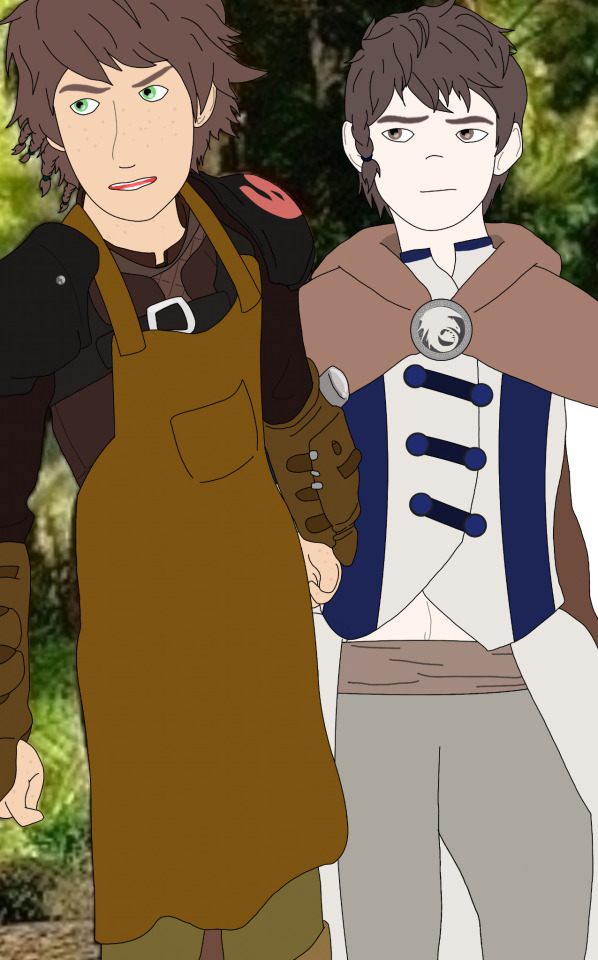
🔵Jack gets dizzy every now and then but he thinks it just the weather or whatever other normal reason.
🟢Hiccup proposes to Jack, they told his parents then Gobber and Aster who proceeded to argue about who gets to walk Jack down the aisle on the wedding day, during which Jack suddenly fainted.
🔵They take Jack to Jamie's adopted mother, who's the village's second best healer. They would go to the first, except he's the one who's the patient. But she couldn't figure out what was wrong with Jack since physically, Jack's vitals seemed strong.
🟢Kozmotis reveals that it's a rare sickness for mages. They rely on mana to create magic, and a maga can produce their own mana. However, if a mage is unable to produce enough mana their magical aura consume their life force.
🔵Jack showed great talent in magic. Part of the reason why he's a good healer, since he uses his magic for that too. Because of the power Jack needs for the magical talent, a lot of mana is needed to compensate it.
🟢Kozmotis says that he has the map to the only cure but even if you get to the coordinates, it seemed like no island is there.
🔵Jack insists they try. Hiccup agrees.
🟢Hiccup doesn't want Jack to come, and Jack fights him on that.
🔵Later, Jack sneaks into the ship used for the voyage.
🟢The cure is Luna, a Light Fury. Instead of fire, she breathes ice. She also produces her own mana energy, and she can share it to any mage.
🔵Crescentia is the Hidden Island that can only be seen during the full moon, and only if there is a Mageborn coming from the outside in search of it. It's coordinates constantly changes, and it's only when a Mageborn uses their magic with the help of a dragon's homing instincts that the island appears.
🟢Nightlight is Jack's brother.
🔵Anastasia is Nightlight's fiancée.
🟢Nightlight is the leader of the mageborns living in the Hidden Island.
🔵Luna is the Guardian protecting the island. It was about to attack them, but when she senses Jack she stopped the preemptive strike and instead kidnaps him and takes him to Nightlight.
🟢Hiccup, of course, is worried sick. Also, enternally exasperated that his fiancé is once again kidnapped.
🔵When Luna brings Jack to his brother, they were making plans for Nightlight's wedding with Anastasia. This made Jack recall a bed time story Aster used to tell him when he was younger about long lost princes.
🟢The Raiders is led by Rasputin, a dark mageborn specializing in Necromancy, summoning the spirit of discord; Eris, with the ill-intent to wipe out all of Jack's people and summon them back from the dead to become his undead army.
🔵Rasputin is Pitch's father.
🟢Tzekal-Kan is a discontent mageborn unsatisfied with being a commoner under Nightlight's rule. He finds Rasputin and betrays the location of where his people are settled.
🔵North, Thiana, and Sanderson are the special warrior units of Nightlight.
🟢When Hiccup and the others find the secret settlement, they encounter the guardian warriors. Before they could engage in combat, Nightlight arrives with Jack and explained the situation to them.
🔵The Maiden warrior festival celebrates the coming of age of young adults.
🟢Nightlight asks Jack to dance there with Hiccup because he missed the opportunity to see his brother come of age but he would very much want to get that chance now.
🔵Before this, Jack helped two year old Jim walk to his mother.
🟢A parent is supposed to be escorting the maiden to the chosen male partner for the dance, so that's what Nightlight does for Jack.
🔵Nightlight also ends Aster and Gobber's continuous feud on who gets to walk Jack down the aisle, since now it was Nightlight's honor.
🟢Roland flirts up a storm with Jack every chance he gets.
🔵Hiccup is so done with it. Jack thought it was amusing at first, but after the twentieth, it started getting annoying. Nightlight continues to find it amusing.
Dialgoues:
Valka, hugging Jack and Hiccup: Congratulations, we're so happy for you two!
Stoick: So, when's the wedding?
Hiccup: We actually still need to talk about the details for the wedding.
Stoick: That's fine then. When are you adopting?
Jack:
Hiccup:
Hiccup: Uh, like I said. We still need... To plan the details for... The wedding first.
Stoick: Hurry along then, I'm not getting any younger. You can be married by tomorrow morning and then the day after, looking into adoption...
Hiccup: Dad!

Aster: I’M WALKING JACK DOWN THE AISLE!
Gobber: Ohhh no… ME!
Aster: Are ya off your wits?! He’s my charge!
Gobber: He’s my charge too!
Aster: I raised him as a baby!
Gobber: I raised both of them over the forge!
Aster: HOW THE BLOODY HELL DOES THAT TRUMP BABY RAISING?!
Gobber: You abandoned him in Berk!
Aster: I GAVE HIM A STABLE HOME AT BERK! Constant sea voyage is not good for a child who suffered a trauma from drowning! Plus, it got them to meet so in a way, I got them together!
Gobber: Hiccup cured him outta that! If anything, ya were negligent in helping him through that!
Hiccup: 😐
Jack: 😑

Aster: I knew his parents before they passed AND I’m his bloody godfather!
Gobber: I taught him everything he knows while ya were absent AND because o’ me, he and Hiccup spent all that time together. I’m their fairy godmother!
Aster: You are the ugliest fairy godmother!
Jack:
Jack: I think I preferred it when they fought over whose inheritor I was going to be…
Hiccup: They sound like a married couple… A divorced married couple.
Jack: Maybe we should call the wedding off and elope…
Hiccup: I don’t know who would kill me for that; dad or mom.

Dimitri, three years old: But I wanna come too!
Astrid: I know you do, but you have to stay here.
Dimitri: How come? You said I'm a warrior just like you!
Astrid: Yes you are, honey. But this adventure has an age requirement.
Jamie: We'll be back before you know it, son.
Hiccup: Yeah, and since I'm going with them, and my dad's old, be sure to help him run the island while looking after your grandparents, okay?
Dimitri: I can be in charge of the island?!
Hiccup, chuckling: Is there any another braver warrior up for the task?
Dimitri: Yay! *he hugs his parents* Mama, papa, I'll be the best chief!
Jamie: I'm sure you will.
[The ships started to set sail...]
Astrid, chuckling: You know Stoick's going to be pissed when he finds out you called him old.
Hiccup, sighing: I'm counting on Dimitri never mentioning that and forgetting it after one nap, actually.

Hiccup: HOW THE HELL DID YOU GET PASS ASTRID?!
Astrid: Excuse me, no one gets passed me. I let him come on board.
Hiccup: ASTRID!
Astrid: It's his life, Hiccup. If he wants to come, let him.
Hiccup: going against a chief orders... This should be treason.
Jamie, shrugging: Think of it this way, if Jack is close to dying and we only have seconds to get the cure to him, he's right there.
Jack: Thanks for making that morbid point....
Hiccup: Seriously Jack! What's with you and stowing away into ships secretly when you're not supposed to?
Jack: Uh, I'm thinking that there's something in that ship that's worth protecting to risk it?
Jamie and Fishlegs: Aww...
Hiccup: No, not 'aww'! It's not a romantic gesture!
Astrid, snorting: It kinda is with a line like that.

Hiccup: you should've stayed back at home.
Jack: Then I don't see a problem, I'm home whenever I'm with you, Hic.
Hiccup: This is serious Jack!
Jack: And you think I'm not? I'm not letting you go on this journey without me. It's always been us against everything, Hiccup. Where you go, I go too.
Hiccup: I can't lose you, not again...
Jack: You're not, and I'm not losing you either.
Hiccup: If something goes wrong...
Jack: Hey c'mon. We're Hiccup and Jack; anything that goes wrong we make it right at the end.

Jack: Seriously, what's the worst that could happen?
Snotlout: Ugh, fucking perfect.
Ruffnut: Now that you said that, it's gotta happen now.
Tuffnut: Seriously, that's just asking for it.
[A piercing cry is heard before it suddenly got very cold and started snowing, picking up quickly until it's a small-scale blizzard...]
Tuffnut: There, you see?

[After Jack's gets whisked away by the Light Fury...]
Hiccup: Odin's breath, this is why I wanted him to stay at Berk! For once, can there not be the urgency to save my fiancé's ass!
Snotlout: Well, maybe if you didn't love it so much...
Hiccup: Snotlout, I swear to the fucking Norns, I will sic Toothless on you for the remainder of this mission if you don't shut up now.

Snotlout: Huh, so Jack's sorta a prince then... Guess my comments when we were kids weren't too off the mark.
Snotlout: And this is kinda making him... More attractive than I originally thought.
Hiccup: Odin's breath, Lout... That's my fiancé you're ogling!
Snotlout: Not too late to change that.
Jack: But impossible to, so don't hold your breath, Jorgenson.
Astrid: Actually, let him. I wanna see what happens.
Eret: Seconded.

[After returning home to Berk after the events of the island...]
Stoick: Hey boys, welcome back!
Stoick, jokingly: So, is Jack pregnant yet?
Hiccup, chuckling nervously: Uh, funny you say that. *Steps aside and reveals Jack carrying one year old Jim.*
Stoick:
Stoick: Wait, seriously? The island got Jack pregnant?
Jack: Uh, that would be a no.
Hiccup: But circumstamces.... Complicated... Long story short, well, the baby's attached to Jack now and his parents are gone, so...
Stoick, moving to carry Jim and called out: VAL! WE HAVE A GRANDCHILD!
Jack:
Hiccup:
Jack: Told you he'd take it well.
9 notes
·
View notes
Text
This is Erin Rose Bar in the French Quarter, an Irish pub always busy. Where SH appeared with the bartender Toby Maloney @tobycocktail in New Orleans.
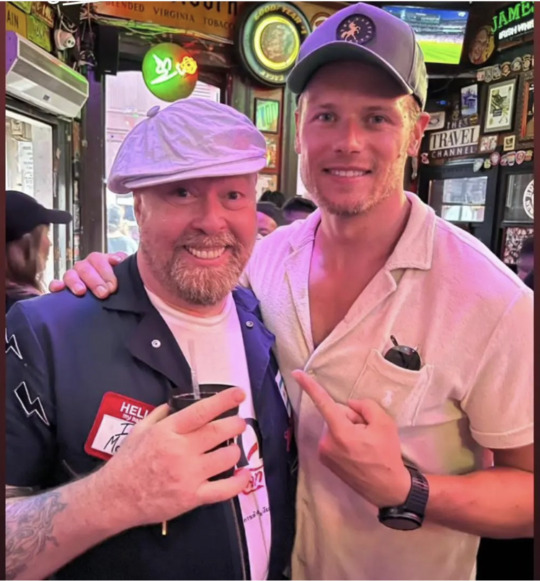
Erin Rose’s life began long before becoming the lovable neighbourhood bar she is today. The property at 811 Conti was a single-family home built in the French Quarter over one hundred years ago and was converted into a bar by the mid-1950s.
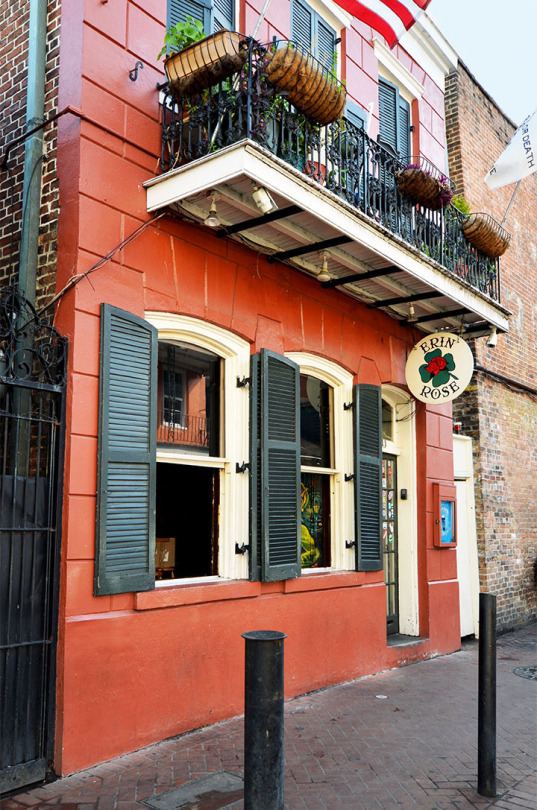
By the early 1980s, Mr Jim Monaghan became the proprietor and placed the management of the bar in several hands before his right-hand man became the absolute caretaker, and took the reins as sole proprietor of Monaghan’s Erin Rose, and shortly after the “Irish Beauty” became known simply as Erin Rose.

During Tales of the Cocktail in New Orleans, try the famed frozen Irish coffee at Erin Rose, just off Bourbon Street. The happiest of all Frappuccinos. 😋
@erinrosebar
2 notes
·
View notes
Text
Blonde: un film non all'altezza del romanzo, o della vita
Ho scelto di vedere questo film una volta passato il clamore, il facile entusiasmo o le stroncature senza appello di chi non ci vedeva la trasposizione fedele della vita di Norma Jean Baker in arte Marilyn Monroe.
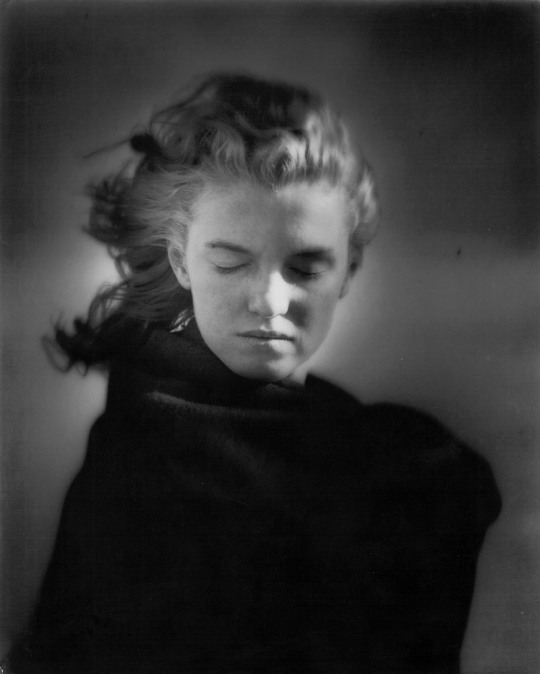
Da quando ero una bambina sono appassionata delle vicende di questa donna, e in secondo luogo di questa attrice. I traumi infantili, la mancanza di un padre, l'essere oggettivizzata dagli sguardi maschili, il rapporto con la maternità mancata (o vissuta): sono tutte esperienze che un'altra donna può comprendere.
Prima dell'uscita del film, con congruo anticipo, mi sono preparata, affrontando le settecentoepassa pagine del corposo e bel romanzo di Joyce Carol Oates dal quale il film è stato tratto: un romanzo, non una fedele biografia. Contenente molte parti di fantasia, molte illazioni credibili ma totalmente inventate, per ammissione della stessa autrice.
Il libro l'ho amato, al punto da averne registrato anche la lettura di un brano, che poi ho condiviso su YouTube. Sebbene sia in larga parte frutto di fantasia, è vivo, palpitante, capace di far percepire sensazioni simili a quelle che deve aver realmente provato Marilyn. A sentirsi violata, recapitata qua e là come un pacco, da una famiglia all'altra, da un letto all'altro.
youtube
Ne esce fuori il ritratto non di una vittima in senso assoluto bensì di una donna segnata fin dalla prima infanzia nel profondo, che rimane intrappolata dal suo aspetto e dal suo talento naturale per la recitazione. Una ragazza tanto sensuale da diventare la proiezione del desiderio altrui, una dea sessuale universalmente riconosciuta. Una donna affamata di sapere, consapevole dei propri limiti, in cerca di un'identità che venga accettata (e che le riporti indietro una figura paterna). Gli uomini che la circondano? In larga parte sono laidi, sfruttatori e, solo in due-tre casi, uomini che provano ad amarla davvero. Oltre a loro, solo il fidato amico e truccatore Whitey.

La sessualità come tema cardine, ciò che avrebbe dovuto esserci e ciò che manca
L'accento sulla sessualità, centrale nel romanzo, resta tale anche nel film: il sesso anale sul tappeto del produttore, rievocato anche in alcuni flashback, il sesso a tre con i "gemelli" (che, a differenza di Norma Jeane, soffrono l'ingombrante presenza dei loro padri), la fellatio fatta a Kennedy. Poi c'è la Marilyn tormentata dal passato, l'orfana di padre (e anche di madre, in una certa misura), l'isterica, la madre frustrata nel suo desiderio di maternità, la donna che fa i conti con la perdita di una vita e di un sogno, la donna violata, l'insicura, che però appena si accendono i riflettori pare splendere di luce propria.
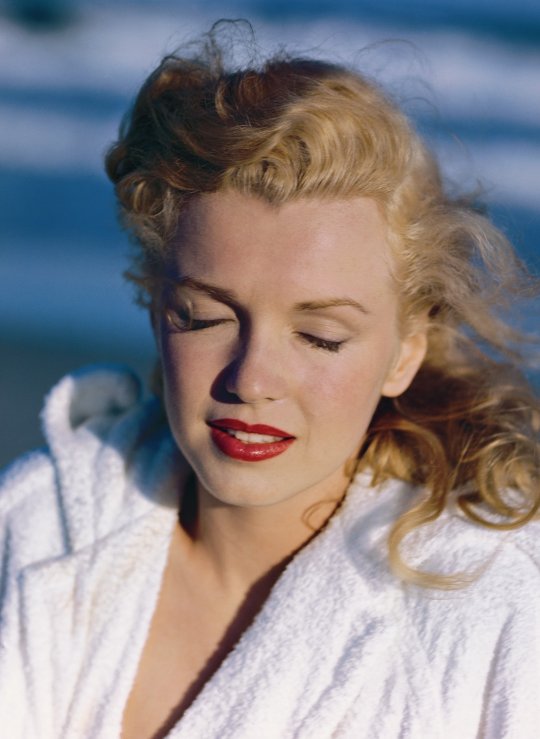
Mancano totalmente all'appello alcune sequenze, peraltro fedelmente biografiche, che nel libro sono essenziali per lo svolgimento dei fatti: la vita all'orfanotrofio di Los Angeles, la sessione fotografica con Tom Kelley (Otto Ose nel libro, ndr), che a distanza di anni la porterà a comparire sul primo numero di Playboy e a dare scandalo; il matrimonio a soli 16 anni con Jim Dougherty (Bucky Glazer nel libro, ndr), durante il quale verrà scoperta come fotomodella; il tour in Corea durante il quale cantò per i soldati americani al fronte: una delle occasioni nelle quali, per ammissione della stessa attrice, lei era stata più felice. Manca anche Happy Birthday Mr President, la canzone di compleanno cantata davvero da Monroe a Kennedy il 19 maggio 1962 al Madison Square Garden di New York, una delle sequenze più vivide del libro (alla quale ho riservato la lettura su YouTube).
youtube
Che né il libro né il film siano strettamente biografici lo si capisce subito, se si conosce bene la biografia di Marilyn. In entrambi non vengono mostrati esplicitamente gli abusi (nel libro sono vissuti in modo vivido come qualcosa al confine tra sogno e ricordo rimosso, senza essere mai descritti), l'amore breve ed extra coniugale con Yves Montand, l'amicizia con Truman Capote (che l'avrebbe voluta nella trasposizione cinematografico del suo Colazione da Tiffany, ndr), la relazione lesbica con l'insegnante di recitazione Natasha Lytess' e tanto altro.

Punti di forza e punti deboli
Quindi ecco quali sono, secondo me, i punti di forza e i punti deboli di questo film.
I punti di forza: il lavoro intenso e coraggioso sul personaggio di Ana De Armas, sulla carta molto diversa da Marilyn, sia fisicamente che come retaggio culturale (De Armas è cubana, sebbene il suo lavoro sull'accento sia stato molto accurato). Tuttavia, De Armas fa di tutto per essere Marilyn, oltre a sottoporsi a lunghissime sessioni di trucco, proprio come la stessa Marilyn: una fase essenziale per smettere di essere Norma e diventare la "maschera" Marilyn; la scrupolosa ricerca iconografica, sebbene questa risulti talvolta erronea e decontestualizzata; i numerosi tentativi di nobilitare l'opera con trovate registiche alternative, con una pretesa di originalità; la fotografia, che è stata curatissima in ogni dettaglio.
youtube
I punti deboli: voler mostrare tutto, spiegare tutto, rendere in modo patinato anche l'intimità della donna Norma Jean (un esempio su tutti: il feto del suo "Baby" mai nato, che poteva tranquillamente essere evocato senza essere mostrato esplicitamente); la superficialità: il film sembra una carrellata di celebri foto di Marilyn, ricreate pedissequamente ma totalmente decontestualizzate e incoerenti nel loro flusso; la scelta di fare la copia/caricatura di Marilyn rendendo De Armas, in certi fotogrammi, quasi irriconoscibile dall'originale; il doppiaggio italiano, esasperato, che riproduce più il doppiaggio dei film di Marilyn (e quella voce da bionda svampita che l'ha resa riconoscibile) che la reale voce dell'attrice.

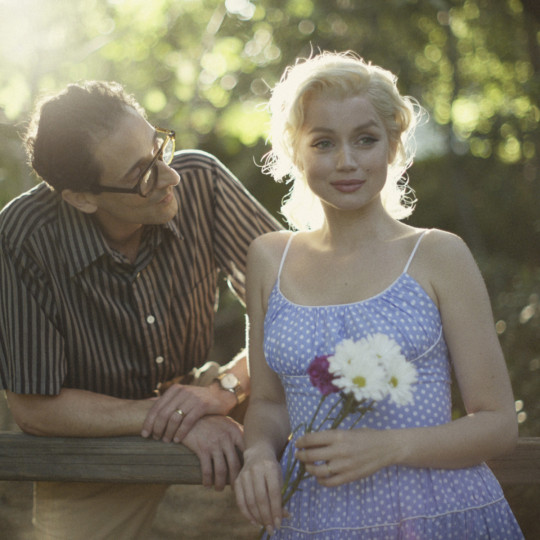
Certe trovate che strizzano l'occhio alla morbosità dello spettatore, come la scena della masturbazione nella sala cinematografica all'anteprima di Niagara, sono superflue e quasi grottesche, oltre a non essere presenti nel romanzo. Al contrario, la scena della fellatio praticata a John Kennedy nel libro è presente e rende bene l'idea dell'umiliazione di Marilyn. In un'intervista a Variety Ana De Armas ha commentato così le scene esplicite alle quali ha preso parte: "Ho fatto cose in questo film che non avrei mai fatto per nessun altro, mai. L’ho fatto per lei (Marilyn, ndr) e l’ho fatto per Andrew. So cosa diventerà virale ed è disgustoso. È sconvolgente solo a pensarci. Non posso controllarlo. Non si può davvero controllare cosa fanno le persone e come estraggono le cose dal contesto. Non credo che la cosa mi abbia fatto avere ripensamenti, mi ha solo dato amarezza pensare al futuro di quelle clip".
Mi sento di giustificare, almeno in parte, il regista Andrew Dominik: un materiale succoso come il romanzo di Oates sotto mano, così visivo e avvincente, era molto facile farsi prendere la mano. L'autrice del romanzo, comunque, è intervenuta in difesa della trasposizione Netflix con un tweet: "Penso che sia stata/sia una brillante opera d'arte cinematografica ovviamente non per tutti. Sorprendente che in un'era post #MeToo la cruda esposizione della predazione sessuale a Hollywood sia stata interpretata come 'sfruttamento. Sicuramente Andrew Dominik intendeva raccontare sinceramente la storia di Norma Jeane".
Le altre Marilyn
youtube
C'è una bella differenza tra Blonde e un film come My Week With Marilyn (2011), che alla sua protagonista è valso un Oscar: a differenza di De Armas, Michelle Williams non pretende di essere il calco identico di MM, sebbene le somigli fisicamente più dell'attrice cubana. Tuttavia le restituisce una verità inconfutabile, senza risultare mai sopra le righe. Certo, bisogna tenere conto di un'altra differenza importante: il film del 2011 è basato sul memoir strettamente biografico di uno scrittore (Colin Clark, ndr) che ha conosciuto davvero Norma Jeane e ci ha passato del tempo assieme, raccogliendone confidenze e pensieri.
Erano i tempi in cui lei si trovava a Londra per girare Il principe e la ballerina con Laurence Olivier nella doppia veste di protagonista e regista (1957) e lui era un giovane neolaureato al suo primo impiego come assistente personale del regista inglese.
Tornando a Blonde, del romanzo di Oates esiste un'altra trasposizione filmica: la miniserie prodotta da CBS con Poppy Montgomery come protagonista. Mi riprometto di vederla al più presto per poter fare un confronto.
#blonde#andrew dominik#ana de armas#joyce carol oates#arthur miller#joe dimaggio#cinema#netflix#Youtube#poppy montgomery#michelle williams#my week with marilyn#marilyn monroe#norma jeane baker
8 notes
·
View notes
Text
A text on the Elizabethian English poet Edmund Spenser, early modern racism, Herodotus, the Irish, and the Scythians (with some critical remarks of mine)
“Beyond the Pale
by Dennis Austin Britton and Kimberly Anne Coles
What happens when we think about race in the works of Edmund Spenser? In spite of the growing body of scholarship now devoted to early modern racial formation, few scholars have explored Edmund Spenser’s treatment of race outside of his treatment of the Irish.[1] Of course, Spenser is important to the study of race precisely because he is implicated in the English colonial project in Ireland. Scholarship on The View of the Present State of Ireland has played an important role in inaugurating Spenser as an early modern producer of race thinking; examining Spenser’s Irish project sheds light on the ways in which race in the early modern period was invested in asserting absolute difference between Protestants and Catholics, maintaining the noble quality of English blood and justifying colonial domination. Yet, race has still not been a central focus in studies of his pastoral poems, his lyric poetry and his Faerie Queene.
With this in mind, and inspired by the wonderful Twitter discussion of The Faerie Queene led by Brooke Conti and Jim Marino during the summer of 2015 (#TeamFQ), we set a challenge: to read each book of The Faerie Queene with attention to race during the summer of 2018 (#TeamFQandRace). This challenge was met with some reserve on the Sidney-Spenser listserv: not everyone who might want to contribute to the conversation was on Twitter, and Twitter’s character limit would not allow for a depth of conversation that some might want. We decided to hold the conversation on two different platforms. This discussion with two different audiences—and expectations for engagement—turned out to be informative. The Twitter conversation was mostly populated with people who would not likely consider themselves ‘Spenserians’, and who enthusiastically engaged our questions. The listserv is, of course, full of Spenserians, and some of the first postings seemed to question the validity of our entire enterprise. Dennis’s opening suggestion that Una’s whiteness might be a possible point of discussion was met with immediate rebuttal.
Lexical evidence suggests a limited use of the term ‘white’ in the period for human description, and this was offered as evidence for why Spenser or any other early modern English author would not have used ‘white’ as a racial signifier. Why not read ‘white’ though the lens of Christian typology? What evidence do we have that Spenser or any other late sixteenth-century European understood themselves as white? Alongside resistance to discussing Una’s whiteness as racially charged came the question whether or not we should talk about race in Spenser’s works at all. Spenser’s understanding of human difference can surely be traced back to Herodotus. Early respondents did not deny the fact that there were forms of racism in the early modern period, but they questioned whether Spenser was unique in his formulation of racial difference. How did his racialization diverge from ancient discussions of ethnic difference? These exchanges are worth relating for two reasons: the almost immediate resistance to the exploration of race in The Faerie Queene; and the fact that the posts cite many of the reasons why.
Such posts could have been written by any number of Spenserians, but they also unwittingly make the case for why more attention to Spenser and race is required. This is not to impugn the accurate assessment that it is unlikely that white Europeans in Spenser’s day thought of themselves as ‘white’. (This development was probably a consequence of rationalizing chattel slavery, and so a later seventeenth-century occurrence). Yet, the authors of these posts seemed unaware that scholars within critical race studies have exfoliated the use of the term ‘white’ in the early modern period. Although early modern Europeans may not yet have collectively understood themselves as ‘white’, skin classified as white or fair was almost universally esteemed over black, brown and tawny skin. Additionally, medieval and early modern physiognomies certainly invested skin colors with meaning. The point is that Spenserians can usefully engage critical race studies, and scholars of critical race studies can usefully engage Spenser: the paucity of attention to race by Spenserians, as well as the lack of attention to Spenser by scholars devoted to early modern critical race studies, is exactly why we have only a limited sense whether or not Spenser’s poetry offers anything unique to our understanding of the history of racial formation.
The suggestion that ancient thinkers like Herodotus are the chief architects of Spenser’s rationale for otherness reveals another set of assumptions. As Richard McCabe has observed, Spenser does indeed employ the methodology of Herodotus when taxonomizing the category of human that the Irish are.[2] He insists that the Irish practice of seasonal migration for the purpose of grazing their animals ‘appeareth plaine to be the manner of the Scithians’; their manner of dress, style of hair is a ‘Custome from the Scythyans’; their arms ‘are verye Scythyan’; their battle cries ‘Scithyanlike’; their funeral rites ‘vncivile and Scithianlike’—all which lead Spenser ‘by the same reasone [as Herodotus]’ to ‘Conclude that the Irishe are discended from the Scythyans for that they vse even to this daie some of the same ceremonies which the Scythyans aunciently vsed’.[3] François Hartog has shown how pliant and metaphorical such a method can be when deployed for an ideological purpose.[4] Hartog’s whole thesis is the fiction of the self, created in the systematic differentiation of the other. But using Herodotus as the model for Spenser’s story of a colonial imperative—indeed, as the same mode for all race thinking in the early modern period—assumes that a set of ethnic practices were not also characterized as ‘natural’ to certain groups. It assumes that these ethnic practices did not, in rhetorical terms, calcify as natural facts pertaining to specific bodies.
To assert that Spenser’s race thinking is the descendant of Herodotus is to assert that the differences reinforced by the logic are ethnic practices and not physiological facts. But if, as Spenser declares in his View of the Present State of Ireland, ‘[T]he minde, followethe muche the Temparature of the bodye’, then bodies are deeply implicated in moral messages.[5] We are all well aware of the ways in which the moral encoding in The Faerie Queene can be read in ways that are unattached to real bodies or real people. Indeed this has been our standard reading practice with The Faerie Queene. The question is not whether whiteness or blackness is attached to actual bodies that are white or black: the question is whether this moral encoding attaches at all. And what happens when we entertain the possibility that it might? Allegory is wax-soft to the impress of ideology: do the embodied terms of Spenser’s religious allegory mean anything apart from the allegory itself? Or, might we read Spenser’s allegory as both drawing from and producing understandings of a racialized body?
We know from Bryskett’s A Discovrse of Civill Life that the character of ‘Maister Spenser’ is deeply interested in how the ‘soule being immortall’ can be ‘troubled with Lethargies, Phrensies, Melancholie, drunkennesse, and such other passions, by which we see her ouercome, and to be debarred from her office and function’.[6] He is here questioning precisely whether the soul is immortal because its implication in material matter might throw that status into question. Spenser the character (if not the man) in Bryskett’s Discourse is troubled by the soul’s transactions with the body, and with the possibility that it might therefore be offered corruption from the body, and might proffer corruption to it. If, in this context, we then try to understand the whiteness of Reformed bodies in The Faerie Queene—and the extent to which Catholic figures are negrified—a different kind of religious allegory might come into view. The Sans brothers, for example, might signal Spenser framing race in terms of not just difference but specifically lack: all of the brothers are descendants of Night, and lacking in faith, joy and law. But Redcrosse Knight also lacks: armor that fits, experience, etc. Nonetheless, he is able to grow and develop; the Sans brothers cannot and do not. In other words, there does not seem to be the possibility of conversion for them.[7] The reform of Redcrosse can be effected by Una; but in spite of her representing the one catholic (small c) church, many Catholic (big C) figures in the The Faerie Queene remain obdurate to her influence. Why is conversion impossible for them?
To what extent is Spenser’s allegory enlivened by the particularities of bodies? Ayanna Thompson rightly points out that ‘a racialized epistemology does not have to be based on a semiotically charged interpretation of skin color so much as a semiotically charged interpretation of bodiliness’.[8] Race thinking, then, should not be understood as adhering only to surface markings; it attaches to bodies that are characterized as different in a variety of ways—through blood, temperament, sinfulness. We as Spenserians, trained to consider the relationship between figure and meaning, should examine race in the bodies in Faerieland that are charged with a Christian typology of black and white. The Faerie Queene is overrun with Paynims, Idolaters and Infidels, whose exaggerated physical features invoke Irish, New World, Eastern and African peoples, and whose physical excess shows them committed to the flesh and not the spirit. These moments no doubt reflect the incarnate experience of the Roman Catholic Church. But they also reflect attachment to the law of man that is grounded in the flesh. In St. Paul’s pronouncement, the law that resides in the ritual experience of the flesh is weak precisely because flesh is poor rock on which to build a church.[9] Spenser’s religious allegory dwells on this problem, and persistently returns to the need to reform the flesh, even to its humoral complexion, before a life of the spirit is possible. But for those who live outside of the spirit—Catholics, ‘Saracens’, and savages—their error resides in flesh itself. Race is not only about understandings of ‘actual’ physiological difference. It is also about a construct of power relations naturalized through a fantasy of the body, the supple figure upon which ideology is scored.[10]
Race studies looks at (proto-)colonial relations, theories of embodiment, the politics of representation, religion and conversion, performance practices, custom, gender and misogyny, all of which have been and continue to be of interest to the study of Spenser. Acknowledging that critical race studies and Spenser studies have shared concerns calls us to put Spenser and race in more deliberate and sustained conversation. To that end, we are coediting a special issue of Spenser Studies on ‘Spenser and Race’. Volume 35 (January 2021) intends to provide new avenues into the study of Spenser’s works, using a focus on race to understand more fully the ethnographic impulse across Spenser’s works, and how his works betray an investment in how bodies differ in their very kind. We believe that the expertise of Spenserians can offer much to the current understanding of early modern racial formation—the deep study of literary modes and figures, hermeneutical controversies, early modern politics and court culture, theological controversies, the historical and literary formation of love and desire, the influence of continental texts and traditions on English literature. Spenserians, on the other hand, need to more fully engage the robust conversation that has been occurring in early modern critical race studies for more than thirty years. Attending to race in early modern English literature is not a new area of study; it is only newly brought to the study of Spenser.[11] Even as Spenserians continue to undercover and appreciate the poet’s deep learning, literary dexterity and linguistic ingenuity, we must also grapple with the role that Spenser, as politician and poet, has played in histories of colonial violence and racial oppression.
Dennis Austin Britton (University of New Hampshire)Kimberly Anne Coles (University of Maryland)
[1] Speaking broadly about Spenser, Gary Waller asserts, ‘race…was starting to acquire some of its modern impact in Spenser’s time, and his career and writings make distinctive contributions to those later developments’ (Edmund Spenser: A Literary Life [New York: Palgrave, 1994], 18). Waller makes this important assertation but does not examine the ‘distinctive contributions.’ Also see Margo Hendricks’s ‘‘Obscured by dreams’: Race, Empire, and Shakespeare’s A Midsummer Night’s Dream,’ Shakespeare Quarterly 47 (1996), 37–60, in which Hendricks examines the racialization of Spenser’s and Shakespeare’s Indian fairies; Kent Lehnhof’s ‘Incest and Empire in the ‘Faerie Queen,’ ELH 73.1 (2006), 215-43, which engages Spenser’s view of the Irish, but offers a reading of incest in Book 3 as relaying Spenser’s fixation on dynastic racial purity; and Dennis Austin Britton’s ‘Ovidian Baptism in Book 2 of The Faerie Queene‘, in Becoming Christian: Race, Reformation, and Early Modern English Romance (New York: Fordham University Press, 2014), 35-58, which examines Spenser’s treatment of ‘Paynim’ racial and religious difference. For a study that shows sensitivity to Spenser’s engagement with the racial difference of none-Irish groups, see Benedict Robinson’s discussion of Spenser’s Saracens, ‘Secret Faith,’ in Islam and Early Modern English Literature: The Politics of Romance from Spenser to Milton (New York, Palgrave, 2007), 27-56.
[2] Richard McCabe, Spenser’s Monstrous Regiment: Elizabethan Ireland and the Poetics of Difference (Oxford: Oxford University Press, 2002), 148.
[3] Edmund Spenser, Spenser’s Prose Works, vol. 9. Rudolf Gottfried (ed.) In The Works of Edmund Spenser: A Variorum Edition. 11 vols: 1932-58, (Baltimore: Johns Hopkins University Press, 1949), 97; 99; 106; 103; 105; 107.
[4] François Hartog, The Mirror of Herodotus: the Representation of the Other in the Writing of History, trans. Janet Lloyd (Berkeley and Los Angeles: California University Press, 1988).
[5] Spenser’s Prose Works, 9:119.
[6] Ludowick Bryskett, A Discovrse of Civill Life: Containing the Ethike part of Morall Philosophie. Fit for the instructing of a Gentleman in the course of a vertuous life (STC 3958), 274.
[7] Vanessa Corredera on Twitter, July 19, 2018.
[8] Ayanna Thompson, Performing Race and Torture on the Early Modern Stage (New York: Routledge, 2009), 4.
[9] See Romans 2:28-29, ‘For he is not a Jew, which is one outwardly; neither is that circumcision, which is outward in the flesh: but he is a Jew, which is one inwardly; and circumcision is that of the heart, in the spirit, and not in the letter; whose praise is not of men, but of God’.
[10] Kim F. Hall has rightly underscored: that, ‘[t]he easy association of race with modern science ignores the fact that language itself creates differences within social organization and that race was then (as it is now) a social construct that is fundamentally more about power and culture than biological difference’ (Things of Darkness: Economies of Race and Gender in Early Modern England [Ithaca: Cornell University Press, 1995], 6).
[11] Margo Hendricks powerfully asserted in ‘Coloring the Past, Rewriting our Future: RaceB4Race’, a keynote given at the January 2019 ‘Race and Periodization’ conference, why scholars who discuss race in the early modern period must engage those—primarily women of color—who have done prior work in the field: not to do so is akin to white settler colonialism. The lecture is available online through the Folger Shakespeare Library: https://www.folger.edu/institute/scholarly-programs/race-periodization/margo-hendricks”
Source: https://www.english.cam.ac.uk/spenseronline/review/item/50.1.5/
And now some remarks on the text that I have reproduced above, in which I will explain why Herodotus’ attitude toward the Scythians is radically different from Spenser’s attitude toward the Irish and why Herodotus cannot be seen as some kind of forefather of the early modern racism of Spenser and others.
1/ Herodotus’ account of the Scythians has of course an important aspect of effort to understand “us” (the ancient Greeks) in comparison to the “other” (the Scythians), especially given the very important differences between the ways of life of the Greeks and of the (mostly nomadic) Scythians. However, Herodotus’ Scythians are not just or mainly an invention of the author, aiming at the confirmation of a collective Greek identity: Herodotus’ Scythian logos contains very often accurate and useful information about the real Scythians, as it is proved by comparative ethnology, but also by important findings of the archaeological research. In this sense, Hartog’s influential interpretation of Herodotus’ description of the Scythians as just an invented “mirror” of the Greeks must be seen as outdated and misleading. On the contrary, Spenser’s effort to establish a link between Scythians and Irish and to present the Irish as Scythian-like was just an artifice of political propaganda.
2/ I think that it is beyond doubt that Spenser hated the Irish (or at least the Catholic Irish, who were and are by large the majority of the Irish population) and had taken position essentially for their genocide by famine. So, the approach of Spenser to the Irish problem is colonialist and genocidal. On the other hand, first of all, the Greek-Scythian relationship was not at all comparable to the relationship between English and Irish, as, despite the existence of some Greek colonies near Scythia, the Greeks did not colonize the Scythians, who were a very powerful nation. The result is that the Greeks saw the Scythians as culturally alien, not as the subjugated, disdained, but troublesome population that were the Irish for their English conquerors, and this is an important difference of political and cultural contexts between Herodotus and Spenser in their approaches respectively of the Scythians and the Irish.
Second and more specifically concerning Herodotus, the truth is that the latter states that he does not approve most of the Scythian customs, despite his relativism and his open-mindedness toward the non-Greek peoples, and this is understandable, because some of the customs of the Scythians were cruel (above all their human sacrifices). This is not exceptional of course, as the sedentary peoples of the Antiquity and the Middle Ages tended to see very unfavorably the nomads, who were perceived as threat and the hostile ‘other’ (often not without reason), with as result that traditions describing the nomads as evil or almost demonical beings were not rare among sedentary nations. In this light, Herodotus’ treatment of the Scythians looks objective and fair and in any case it would be unreasonable to say that Herodotus hated the Scythians, as Spenser hated the Irish.
Moreover and most importantly, despite his critical attitude toward the Scythian way of life, Herodotus sympathizes with the Scythians’ love of freedom and with their willingness to defend their freedom face to the mighty Pesian Empire, and he describes the Scythian defense of their country as a combination of military valor and cunning. The differences with Spenser are again crucial: Spenser loathes the Irish aspiration to independence and sees the Irish as a worthless, backward, and troublesome people whom the English should exterminate, whereas Herodotus sees with sympathy the Scythians’s defense of their freedom and, despite his criticism of their customs, recognizes to them some important virtues. On the contrary, it seems that Herodotus shares the contempt of the Scythians for the Ionian Greeks who, out of self-interest or servility, facilitated the retreat of the Persian Great King Darius from Scythia...
6 notes
·
View notes
Text

Keasbey Nights by Streetlight Manifesto (originally by Catch 22) is Trans Masc!
#request#album#keasbey nights#transgender#trans#transmasculine#transmasc#trans masc#streetlight manifesto#catch 22#jim conti#jamie egan#tomas kalnoky#Chris Paszik#Dan Ross#Mike Soprano#Chris Thatcher#ska punk
48 notes
·
View notes
Text
HEATHER COX RICHARDSON
June 23, 2022 (Thursday)
Then-president Trump’s demand of Acting Attorney General Jeffrey Rosen on December 27, 2020 was simple: “Just say the election was corrupt and leave the rest to me and the Republican congressmen." But the election wasn’t corrupt, and Rosen wouldn’t do as Trump asked.
Today’s fifth public hearing of the House Select Committee to Investigate the January 6th Attack on the U.S. Capitol was a barnburner. It explored Trump’s attempt to pervert the Department of Justice (DOJ), whose mission is “to enforce the law and defend the interests of the United States…and to ensure fair and impartial administration of justice for all Americans,” to the service of Trump alone.
By now, the committee has firmly established that there was no evidence for Trump’s insistence that the election was stolen from him. Instead, recounts, court cases, and investigations all showed that Biden was the true victor by more than 7 million votes in the popular count, and by 306 to 232 votes in the Electoral College, the same count by which Trump won in 2016 and which he called a “massive landslide.” There was no evidence for his claims, and Trump knew that. His own appointees, including his attorney general William Barr, had told him repeatedly that the incidents he cited as proof were not, in fact, real. Barr called his arguments “bullsh*t.” But Trump continued to push them, quite possibly simply to lay the groundwork for keeping control of the government by force.
Led by Representative Adam Kinzinger (R-IL), the committee members today questioned officials who served in the Trump administration at the end of his term: Jeffrey Rosen, who replaced Barr as acting attorney general in December 2020; Richard Donoghue, acting deputy attorney general and also a 20-year military veteran; and Steven Engel, assistant attorney general for the Office of Legal Counsel during Trump’s administration. Engel helpfully explained that the Office of Legal Counsel is essentially the lawyer for the attorney general and the president.
Rosen told the committee that Trump repeatedly pressured him and Donoghue to say that the 2020 election had been marred by fraud. But while they investigated his accusations, they found no evidence to support them. So Trump began to pressure them through public statements, telling television viewers as early as November 29, 2020, that the DOJ was “missing in action,” its leaders refusing to do their job. Members of Congress, who knew the allegations were false, echoed him. They included Louie Gohmert (R-TX), Andy Biggs (R-AZ), Paul Gosar (R-AZ), Matt Gaetz (R-FL), Jim Jordan (R-OH), and Mo Brooks (R-AL).
On December 21, a number of members of Congress met with Trump. Marjorie Taylor Greene (R-GA) was the only newly elected member; she would not be sworn in until January 3. The rest appeared to be members of the far-right so-called Freedom Caucus, formed in 2015 by Mark Meadows, then a congress member from North Carolina, and Mick Mulvaney, then a representative from South Carolina. (Both Meadows and Mulvaney would serve as Trump’s chief of staff during his presidency.) Jordan was the caucus’s first chair; Meadows was its second; Biggs was its third. Scott Perry (R-PA), who was there, is close to Jordan and Meadows.
Meadows, then White House chief of staff, tweeted that they had met to fight back against “voter fraud.” The next day, Perry went back to the White House with an environmental lawyer from the DOJ, Jeffrey Clark.
On December 24, Trump mentioned Clark to Rosen in passing. On December 26, Rosen asked Clark why Trump knew him. Clark admitted that he had met with the president when Perry took him—unexpectedly—to the White House. Clark was defensive, in part, perhaps, because there are strict guidelines to keep the DOJ and the White House separate to make sure there is neither impropriety nor the implication of impropriety when the DOJ investigates crimes. Clark promised Rosen it would not happen again.
And yet, Perry continued to text Meadows to urge him to put Clark at the head of the DOJ in place of Rosen. Trump told Perry to call Donoghue to push Clark’s elevation, saying Clark would get into the job and, unlike Rosen, “get in there and do some stuff.”
As Trump continued to press, he called Rosen and Donoghue at their homes late on December 27. Donoghue took notes. When Donoghue said the "DOJ can't and won't snap its fingers + change the outcome of the election," Trump replied it didn’t have to. "Just say it was corrupt and leave the rest to me and the Republican congressmen."
On December 28, Clark emailed to Rosen and Donoghue a letter alleging that the DOJ had “significant concerns that may have impacted the outcome of the election in multiple States.” It urged state legislatures to “consider objections” to the certified ballots and “decide between any competing slates of elector certificates.” The allegations in this letter were straight up false, but Trump wanted the Department of Justice to give them credence. Clearly, there was no time to actually conduct another investigation into the election before January 6; the letter was designed simply to justify counting out Biden’s ballots or, failing that, to create popular fury that might delay the January 6 count.
This attempt to use an investigation to corrupt politics echoed Trump’s attempt to get Ukraine president Volodymyr Zelensky to announce an investigation into the actions of Hunter Biden in 2019 to seed the idea in the U.S. press that Biden was corrupt. It also recalled the 2016 drumbeat of an investigation into Secretary of State and Democratic nominee Hillary Clinton’s use of a private email server. Indeed, the Republicans have deliberately used “investigations” to convince the public of things that are not true since 1994 investigations of “voter fraud” that elected Democrats, and even back to Senator Joe McCarthy’s “investigations” of communists in the government in the 1950s. In each case, the goal was not actually to find the truth; it was to plant in the public mind the idea that there were crimes being committed…for why would anyone investigate if something wasn’t amiss?
Clark wrote the letter on official DOJ letterhead and left places for Rosen and Donoghue to sign it. Both of them rejected it out of hand, in strong language. Clark continued to push, and then to call witnesses and start his own investigation. Clark was working with Ken Klukowski, who arrived at the DOJ on December 15 and who was working with John Eastman, the lawyer pushing the idea of Pence counting out the Biden electors in states Trump wanted to win, suggesting that Trump had installed a conspirator directly in the DOJ to work with Eastman on the project.
On December 31, Trump asked both the DOJ and the Department of Homeland Security to seize voting machines that he insisted had shifted votes; Rosen said they had investigated and the machines were fine. At the end of that meeting, Trump warned that he thought he should just get rid of Rosen and Donoghue and put Clark in charge because then things would get done.
Rosen continued to debunk the election claims Trump and his allies were sending and tried to stop Clark from egging Trump on; Clark doubled down and demanded they sign the letter. On January 3, Clark told Rosen that Trump had offered him the job of attorney general, replacing Rosen, and that he would decline the job if Rosen signed the letter.
Rosen asked for a meeting with Trump, Engel, and White House counsel Pat Cipollone. At that point, only four people knew what Clark and Trump were up to, but Rosen now included the assistant attorneys general, all of whom said they would resign if Trump replaced Rosen with Clark. Both Rosen and Donoghue vowed to quit, too. But White House call logs—which the Trump administration tried to keep private—show that Trump and Clark had been in constant contact, violating official policy, and by 4:19 that afternoon, Trump was already referring to Clark as the attorney general.
“What have I got to lose?” Trump demanded. In a meeting of more than two and a half hours, Rosen, Donaghue, and all the other lawyers present except Clark warned Trump that there would be mass resignations from the DOJ if he went through with his plan, and that his decimation of the DOJ would overshadow all of his claims about the election. Cipollone called the idea a “murder-suicide pact.” Trump backed down then, but at the Ellipse three days later, he repeated all his debunked claims about the election.
Trump called neither Rosen nor Donoghue on January 6, although they spoke to all other top lawmakers, including Vice President Mike Pence.
After the attack on the Capitol, the congress members who had participated in the December 21 planning meeting asked for presidential pardons. Those members included Biggs, Greene, Brooks, Gaetz, Gohmert, and Perry. (Gaetz is under investigation for sex trafficking a minor; presumably a blanket pardon would have covered that issue, too.) Biggs, Gaetz, and Gohmert sit on the House Judiciary Committee, which oversees the DOJ.
Jordan asked more generally about pardons for members of Congress who had worked with Trump to overturn the election. Trump awarded Jordan the Medal of Freedom, the nation’s highest civilian honor, on January 11, 2021. House Minority Leader Kevin McCarthy (R-CA) initially named Jordan, the top Republican on the Judiciary Committee, to serve on the January 6th committee and withdrew the other Republicans when House Speaker Nancy Pelosi (D-CA) rejected Jordan and Jim Banks (R-IN).
And Brooks wrote to Trump’s executive assistant Molly Michael, saying “President Trump asked me to send you this letter…. I recommend that President give general (all purpose) pardons to…[e]very Congressman and Senator who voted to reject the electoral college vote submissions of Arizona and Pennsylvania.”
When interviewed about the letter, Clark repeatedly took the Fifth Amendment against self-incrimination and invoked executive privilege. Yesterday, federal investigators executed a search warrant on Clark’s home in suburban Virginia. They seized his electronic devices.
At the end of today’s hearing, Representative Liz Cheney (R-WY), the January 6 committee’s vice chair, directly addressed Trump supporters: “It can be difficult to accept that President Trump abused your trust, that he deceived you. Many will invent excuses to ignore that fact. But that is a fact. I wish it weren’t true, but it is.”
4 notes
·
View notes
Text
'VIEWS FROM THE EDGE' - w/c 18th September 2023
Editors ‘An End Has A Start’
Mark Knopfler ‘Going Home (Theme For A Local Hero)’
Arkan ‘Ambush’
Funeral For A Friend ‘Streetcar’
Jim Croce ‘I’ll Have To Say I Love You In A Song’
Anju Naseeb Ahlawat ‘Malta’
One World ‘Freedom For Palestine’
Hundred Reasons ‘Dissolve’
Eddi Reader ‘Ye Jacobites’
Warmly Amarone ‘Desegregation’
Pink Floyd ‘Sheep’
Auctioneers ‘Kelso Ram Sales 2023’
AS Opus3 ‘Sheep Identity’
Zoe Ann ‘Stronger’
Le Woodsmen ‘Keep On Running’
Lucy Spraggan ‘Run’
Steve Winwood ‘Keep On Running’
Jonathan Postal ‘Send It C.O.D.’
Jonathan Postal ‘The Girl In The Glass Cage’
Kenelis ‘Moving To Brighton’
Stray Cats ‘Rumble In Brighton’
Roisin McCarney ‘Villain’
Carmen Villain ‘How Much’
Neil Young ‘Heart Of Gold’
Joan Armatrading ‘Tall In The Saddle’
Heather Small ‘Proud’
Tom Petty ‘I Won’t Back Down’
Bill Conti & Natalie Wilde ‘Gonna Fly Now RMX’
Foreigner ‘Eye Of The Tiger’
0 notes
Text










AEW DYNAMITE - EPISODE 81
April 21, 2021
Jacksonville, FL - Daily’s Place
Commentary: Jim Ross, Tony Schiavone, Excalibur, Taz
Attendance: 800
Viewers: 1,104,000
-Hangman Page d. Ricky Starks
-Penta El Zero Miedo d. Trent Beretta
AEW WOMEN’S WORLD TITLE MATCH
-Hikaru Shida (c) d. Tay Conti to retain the title (9th defense)
-QT Marshall d. Billy Gunn
-Christian Cage d. Powerhouse Hobbs
AEW TNT TITLE MATCH
-Darby Allin (c) d. Jungle Boy to retain the title (8th defense)
0 notes
Text
3€ SPEDIZIONE GRATUITA - PIEGO LIBRI ORDINARIO
consegna gratuita nell'area del comune di Firenze / contatto telefonico su richiesta
LIVELLO BIBLIOGRAFICO: Monografia
TIPO DOCUMENTO: Testo a Stampa
AUTORE PRINCIPALE: Giorgio Faletti
TITOLO: Fuori Da Un Evidente Destino
CASA EDITRICE: Baldini Castoldi Dalai
LUOGO DI PUBBLICAZIONE: Milano
ANNO DI PUBBLICAZIONE: 2007
DESCRIZIONE FISICA: 495 pagine; dimensioni: 18 x 10,5 x 2,5 cm
COLLEZIONE: I Mini; nr.7
NUMERI: ISBN 978-88-6073-154-8
CLASSIFICAZIONE DEWEY: 853.914(20.) NARRATIVA ITALIANA. 1945-
LINGUA DI PUBBLICAZIONE: Italiano
LINGUA DELL'OPERA ORIGINALE: Italiano
PAESE DI PUBBLICAZIONE: Italia
CODICE IDENTIFICATIVO: IT\ICCU\CAG\1402733
CONDIZIONI: copertina consumata e pagine ingiallite dal tempo – alcune scritte a matita del vecchio proprietario
Il passato è il posto più difficile a cui tornare. Jim Mackenzie, pilota di elicotteri per metà indiano, lo impara a sue spese quando si ritrova dopo parecchi anni nell'immobile città ai margini della riserva Navajo in cui ha trascorso l'adolescenza e da cui ha sempre desiderato fuggire con tutte le sue forze. Jim è costretto a districarsi tra conti in sospeso e parole mai dette, fra uomini e donne che credeva di aver dimenticato e presenze che sperava cancellate dal tempo. E soprattutto è costretto a confrontarsi con la persona che più ha sfuggito per tutta la vita: se stesso. Ma il coraggio antico degli avi è ancora vivo ed è un'eredità che non si può ignorare quando si percorre la stessa terra. Nel momento in cui una catena di innaturali omicidi sconvolgerà la sua esistenza e quella della tranquilla cittadella dell'Arizona, Jim si renderà conto che è impossibile negare la propria natura quando un passato scomodo e oscuro torna per esigere il suo tributo di sangue.
#giorgiofaletti#2006#culturastorica#romanzo#piegolibri#narrativaitaliana#arizona#delitti#conflitto#potere#politica#storia#jimmackenzie#italia#letteraturaitaliana#florence#tuscany#toscana#spedizionegratuita#consegnaadomicilio#tascabile#italiano#inglese#navajo#violenza
0 notes
Text
'Prior to the start of the SAG-AFTRA strike, the cast of Oppenheimer was extremely active in publicizing writer-director Christopher Nolan's new biopic of J. Robert Oppenheimer, the so-called "father of the atomic bomb." Stars Cillian Murphy, Emily Blunt, Matt Damon, and Robert Downey Jr. undertook a slew of promotional appearances (including EW's Around the Table). That quartet was joined at the film's London premiere, or at least its start, by Florence Pugh, Josh Hartnett, Kenneth Branagh, Rami Malek, and Tom Conti.
There is one notable Oppenheimer actor, however, who did not walk the red carpet in London and whose name was mostly absent from the pre-release hoopla: Gary Oldman. The Darkest Hour Oscar winner plays President Truman, the man who was ultimately responsible for dropping the atomic bombs on Hiroshima and Nagasaki. In the film, Oldman appears in just one — albeit very memorable — scene where the commander-in-chief has an uneasy encounter at the White House with Murphy's Oppenheimer, who is clearly guilt-stricken about the loss of life caused by the weapons that he played a huge role in developing.
While Nolan clearly intended Oldman's appearance in the movie to be a surprise, it is no shock that the director should reteam with the actor. The filmmaker has no problem casting the same actor in different roles. Nolan cast Murphy in five films prior to Oppenheimer and Michael Caine has appeared in eight movies by the director, including Interstellar, whose cast also featured Damon. Oldman, of course, previously worked with Nolan on the director's trilogy of Batman tales, portraying Gotham police chief Jim Gordon in 2005's Batman Begins, 2008's The Dark Knight, and 2012's The Dark Knight Rises.
While participating in EW's Around the Table, Murphy confirmed that Oldman appears in the movie, though not which character he plays in the film. "For me, every day, I was working with the best actors in the world, every single day, and you'd look at the call sheet and there'd be, like, Gary Oldman one day, and then Ken Branagh, and then these guys," said the 28 Days Later star, indicating Blunt, Damon, and Downey. "It was very hard to be cynical when you're working with that level of talent."
Oppenheimer is based on Kai Bird and Martin J. Sherwin's book American Prometheus: The Triumph and Tragedy of J. Robert Oppenheimer which details the October 1945, encounter between the pair's subject and Truman. According to the authors, Oppenheimer told the President that he felt he had "blood on my hands," which angered the commander-in-chief. Truman later told his Secretary of State Dean Acheson, "I don't want to see that son-of-a-bitch in this office ever again." (The line is slightly modified in the movie.)
#Oppenheimer#American Prometheus#Kai Bird#Martin J. Sherwin#Gary Oldman#President Truman#Kenneth Branagh#28 Days Later#Emily Blunt#Kitty#Matt Damon#Leslie Groves#Robert Downey Jr.#Lewis Strauss#Niels Bohr#Christopher Nolan#Cillian Murphy#Florence Pugh#Josh Hartnett#Rami Malek#The Dark Knight Trilogy#The Darkest Hour#Interstellar
0 notes